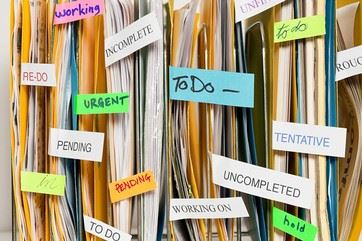
Do you have great difficulty or discomfort parting with things?
Do you struggle on a regular basis to manage your time?
Have you accumulated mass quantities of items such as documents, miscellaneous papers or possessions beyond apparent necessity or pleasure?
You could be struggling with chronic disorganization. The National Association of Professional Organizers in Michigan want to inform you and provide you with the resources to help.
Chronic disorganization is not a disease or an illness. Chronic disorganization is a term coined by Judith Kolberg, an expert in ADD and chronic disorganization. She wrote the book Conquering Chronic Disorganization when she noticed a lack of resources for her clients that had great difficulty maintaining traditional organizing methods.
How is chronic disorganization defined? The Institute for Challenging Disorganization (ICD) defines chronic disorganization using the following three criteria:
1. Chronic disorganization is having a past history of disorganization in which self-help efforts to change have failed.
2. An undermining of your current quality of life due to disorganization.
3. An expectation of future disorganization.
Chronic disorganization is not to be confused with situational disorganization. An ICD Fact Sheet titled “Are you Situationally Disorganized?” shares with us that situational disorganization occurs when one finds oneself in clutter or chaos for a short period of time, resulting from an unusual turn of events or changes in your living arrangements such as moving, a death of a loved one, having a baby, or getting divorced.
Can you relate to the chronic disorganization criteria listed above or does someone you know come to mind?
If you, a family member, perhaps a friend or coworker is chronically disorganized, and it is not situational disorganization, first and foremost, be patient!
Chronic disorganization did not happen overnight. It is not resolved overnight. It takes time and energy to learn and practice new strategies to cope with being chronically disorganized.
Chronically disorganized individuals have been described to be highly intelligent, innovative, and creative.
Dealing with the disorganization however, can be difficult and frustrating. You don’t have to cope with it alone.
Working with a Professional Organizer and related professionals knowledgeable about chronic disorganization will assist in the progress. Related professionals who can provide support include life coaches, organizing coaches, social workers, therapists, counselors, psychiatrist, or psychologists.
Additionally, online programs, articles, and books, home study classes, and on-line or local support groups are available.
Recovering from chronic disorganization is possible!
For a directory of Professional Organizers in your area, or to learn more about chronic disorganization, please visit the following websites:
www.NAPOMichigan.com
www.NAPO.net.
www.challengingdisorganization.org.
Article submitted by Chapter member Mindy Fairbanks, at https://www.linkedin.com/in/mindyfairbanks